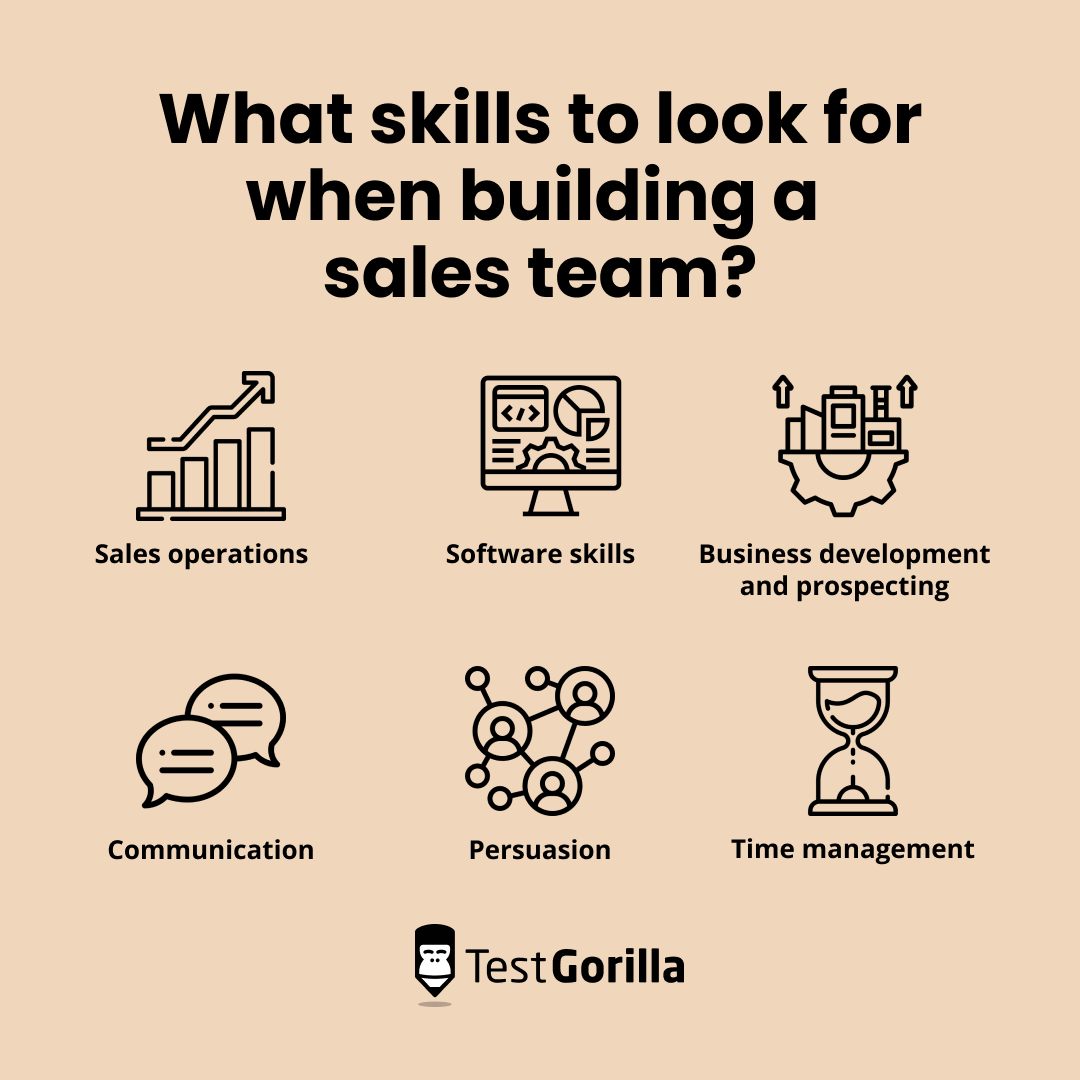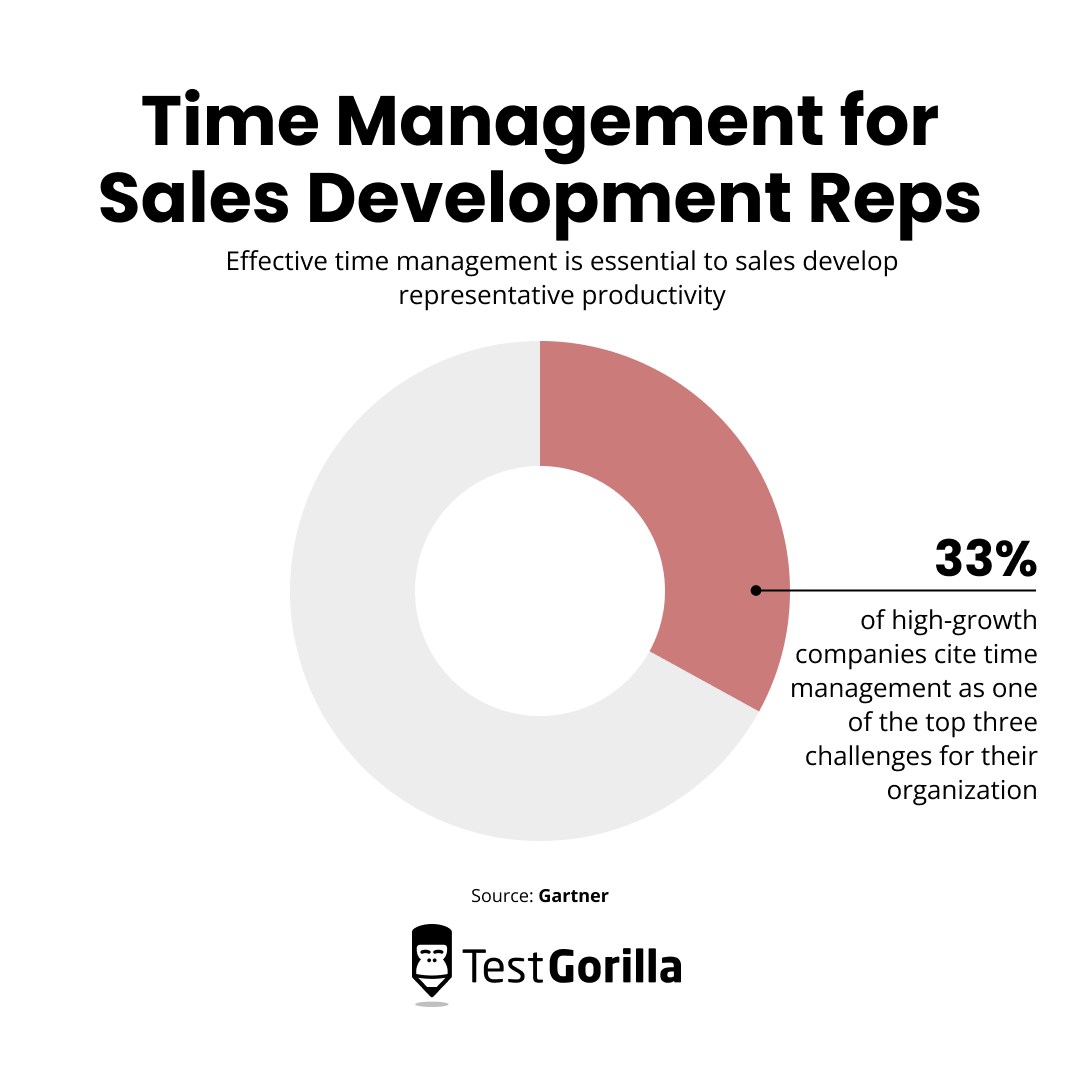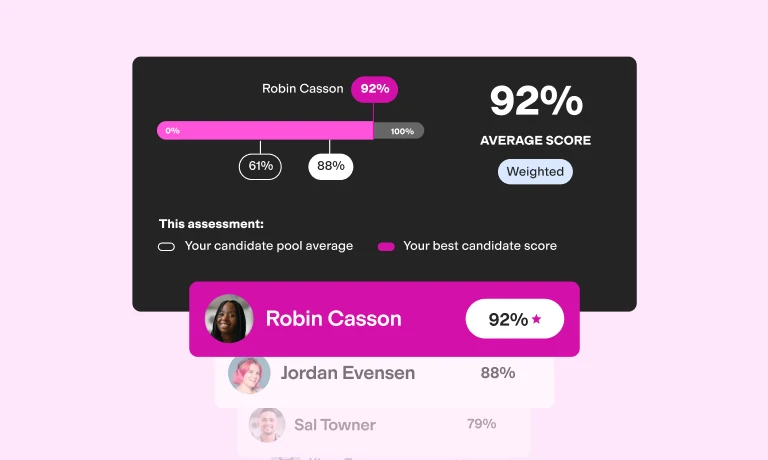When we think about a good sales team, we often picture a team of outgoing and persuasive A-players. So, if you hire for those qualities, it should be easy to build a well-performing team, right?
However, it takes more than this to build a successful sales team. Smooth talkers can persuade some people into paying for your products or services but they won’t be able to provide consistent, long-term results.
If you want to build a sales team that can regularly meet targets and increase customer satisfaction, you need to streamline your hiring process.
In this step-by-step guide on how to hire a sales team, we’ll help you structure your hiring process and pick the right candidates for your organization. Here, you’ll find more information about:
What sales teams do
What are the essential roles you should be looking to fill
The fundamental skills of sales professionals
How pre-employment skills testing can help you assess them objectively
Hiring an effective sales team will be easier if you follow the eight steps we’re going to outline in this guide.
What do sales teams do?
Your sales team is responsible for selling your company’s products or services to an audience of prospective and existing customers. A good sales team can make the difference between success and failure for any organization, as it:
Increases lead conversion rates
Builds strong customer relationships
Improves customer retention
Helps you achieve your company’s sales and revenue goals
The sales team is the backbone of any organization that wants to stay competitive in the market and grow. Think of it as an investment in your company’s future.
It’s critical to understand that your sales team’s role in your organization isn’t limited to selling your company’s products.
This is an important part of their job, but the sales team fulfills other fundamental business functions as well, such as:
Gaining insight into customers’ needs and challenges: Your sales team is your best source for target-market research and can help you gain invaluable insights into your ideal customer persona. They can provide key information to help you align marketing, sales, and product development.
Evaluating customer satisfaction: Usually, that’s the job of the customer support team. But anticipating problems before your customers have to reach out and complain helps you increase user satisfaction.
Increasing customer retention rates: One of the key performance indicators (KPIs) indicative of your company’s success is your retention rate, or what percentage of your clients stay for the long term. A good sales team is key for building customer loyalty.
What are the most essential roles in a sales team?
The exact roles of your sales team will depend on your needs and the type of products or services that you’re offering.
For example, you’d need a product expert or a pre-sales consultant on your sales team if you’re offering more complex products that require answering technical questions. If your products are relatively straightforward, this might not be necessary.
Here are some of the most essential sales team job roles:
Sales director
The sales director manages and oversees all operations within the sales department. This is a critical role for every business with a focus on sales and a complex sales-team structure. Their main duties are to:
Define sales goals and targets and design strategies to meet them
Decide on the best team structure that would help support those goals
Help the team cultivate strong relationships with clients
Participate in defining the overall objectives of the business in cooperation with other executives
Sales managers
A sales manager is the leader of a sales team and reports directly to the area manager or the sales director who oversees all sales operations across every team. Their responsibilities include:
Setting clear and achievable sales goals
Recruiting and mentoring new team members
Monitoring and evaluating employee performance
Doing sales forecasting
Area managers (EMEA, LATAM, NA, and more)
Area managers, also known as regional managers, are responsible for the sales operations of a defined region. All of your organizations’ sales teams within that territory report to them.
Area managers:
Provide training and guidance to sales teams
Ensure consistent quality within their area
Focus on increasing sales across their region
Areas are large geographic regions, such as:
EMEA: Europe, Middle East, and Africa
LATAM: Latin America
NA: North America (USA, Canada, and sometimes Mexico)
APAC: Asia-Pacific (Asia plus Oceania)
Your company might also use smaller areas, such as CEE (Central and Eastern Europe), MENA (Middle East and Northern Africa), and more.
Account managers
Account managers are the liaison between your company and your customers. Their responsibility is to address the customer’s needs and concerns as quickly as possible and to provide effective solutions that can increase customer satisfaction.
Sales representatives
Sales representatives work directly with leads. Their main objective is to convert prospects into customers and customers into loyal long-term clients. At the end of the day, their contribution to the team has a direct impact on your sales revenue.
The best insights on HR and recruitment, delivered to your inbox.
Biweekly updates. No spam. Unsubscribe any time.
Top sales skills: What skills to look for when building a sales team?
When you’re building a sales team, it’s best to outline in advance what skills are essential for each role. This includes hard, role-specific skills, soft skills, and cognitive abilities.
Some of the skills you should be looking for in sales professionals include:
Sales operations
Your sales team should have a thorough knowledge of the basics of the sales process. People tend to think selling doesn’t require a lot of in-depth operations knowledge but knowing how to structure sales processes can make a big difference in your results.
This includes a deep understanding of the five main sales operations, which are to:
Initiate contact
Assess the lead’s needs
Provide a solution
Close the sale
Follow up and build a long-term relationship
Software skills
Nowadays, technology is a big part of sales, regardless of the industry. Digital tools help organizations optimize and speed up the sales lifecycle. Practical skills with relevant software tools are essential. This may include:
Customer relationship management (CRM) tools such as HubSpot CRM, Salesforce, Pipedrive, and more
Presentation programs, such as Microsoft PowerPoint, Google Slides, Keynote, Prezi, and more
Proposal and contract management software, such as PandaDoc, HelloSign, Proposify, and more
Business development and prospecting
Business development is the process of growing your business by searching for potential customers (prospects), identifying valuable partnerships, researching market expansion opportunities, and more.
Prospecting is a more focused sales process of identifying leads and reaching out to them.
Both are essential for the growth of your business.
Sales teams usually work with a database of likely customers and partners and then systematically reach out to them to explore sales and partnership opportunities. This requires practical knowledge of the different stages of the sales process and using the right tactics for each step.
Communication
If you’re not an excellent communicator, you’re probably not cut out to work in sales.
Salespeople with excellent communication skills will be able to:
Communicate politely and professionally
Listen actively to your prospects and customers to identify their needs
Read and use non-verbal cues correctly
Provide useful and specific responses to your customers’ concerns
Build rapport and be convincing and engaging
Persuasion
It can be a challenge to master the art of persuasion in sales. There is a thin line between assertive and aggressive behavior and it’s important to hire sales professionals who know that.
According to research published on the Social Science Research Network (SSRN), high-pressure, aggressive sales tactics are harmful and lead to worse outcomes than directive sales, in which salespeople are helpful, informative, and persuasive.
Articulating the benefits of your offers clearly and concisely and using an approach that’s personalized to the needs of every prospect is what enables sales professionals to be persuasive without being pushy – and grow your business.
Time management
According to a 2019 study by Gartner, one third of high-growth companies say that addressing challenges around the ways their sales development reps manage their time is one of their top priorities.
And indeed, the more time you spend selling, the better you become at it and the more chances you have to hit your objectives. According to the same study, 83.4% of sales reps fail to hit their targets each month.
Is this a matter of unrealistic targets or of poor time management, you might wonder? Perhaps a bit of both – but time management is an essential part of the equation.
In many industries, you can’t close a deal with a customer after one interaction. So, planning your encounters with your customers in a time-effective manner can help you manage multiple sales and reach targets.
How to build a successful sales team: A step-by-step guide
In this guide on how to hire a sales team, we’re going to take you through the eight steps you need to take to build the best sales team for your company.
Define the structure of your future sales team
First, determine the size and structure of your sales team. This will depend on your goals and sales culture, so there is no one-size-fits-all solution for this.
Follow these steps:
Determine the projected annual sales volume of your business
Estimate the annual targets for every sales professional
Divide the estimated sales volume by each sales representative’s projected targets to define the optimal number of people you need to hire
Then, you must define the hierarchy of the team based on your company’s objectives and culture.
The three most common types of team structures for sales teams are:
The Island
The Assembly line
The Pod
The island
The island is a simple structure that gives more autonomy to every team member and requires hiring more sales representatives and fewer managers. Under this structure, each representative works with the same leads and customers from the beginning of their journey through the sales funnel.
This structure creates a more individualistic and competitive culture and puts more emphasis on the role of the sales rep. The team might consist of a single sales manager and multiple salespeople.
The assembly line
With this method, there are many specialized teams that handle every stage of the sales process separately. After one team is done with their task, they hand it over to the next.
This structure speeds up the sales process and allows more specialized attention to every task but it also increases the risk of bottlenecks and miscommunication across teams.
This structure has more levels. Key roles here include:
A sales director
Account managers
Team leads
Sales representatives
The pod
The pod is a combination of the island and the assembly line. It’s favorable for larger organizations looking to scale. Each team is a pod of specialized sales professionals on different levels of the hierarchy and they manage the sales process from A to Z for their assigned customers.
It ensures a strong collaborative spirit but it makes it hard to be competitive which can sometimes affect sales poorly. The key roles here are the same as with the assembly line.
Identify the roles for which you need to hire
Now it’s time to identify the roles for which you need to hire.
Consider what type of professionals you need to meet your objectives. This depends on various factors, such as your:
Industry
Products or services
Competitors
Target market
Consider whether each role requires hiring a full-time employee. Depending on your company’s size and sales team structure, you might consider hiring freelancers for some vacancies.
Define key sales skills for each role
To be successful in hiring, you have to know what skills are essential for each role.
Here are some examples:
Sales managers or directors need strong leadership and people management skills, excellent time management skills, and also a strategic mindset enabling them to build and execute processes.
Sales representatives need to be excellent communicators and negotiators and have strong knowledge of different technological solutions. They also need to be flexible and adapt to evolving circumstances easily.
Source sales candidates
The next step is to use reliable sources for candidates. Here are some ideas you can explore:
LinkedIn: You can connect directly to a talent pool of over 600 million candidates on LinkedIn.
CareerBuilder: This platform offers a wide range of features, including AI-powered job postings and advanced search options.
Salesfolks: This platform focuses on freelance sales professionals and it can help you build a qualified and flexible sales team.
1840 & co: Here you can hire a remote or flexible vetted sales team for your organization.
National association of sales professionals (NASP): The NASP has a careers center that you can use to post an ad or get in touch with top sales professionals in the US.
Internally: Many companies prefer to leverage their existing workforce’s skills, especially when it comes to hiring for leadership roles.
Evaluate sales skills
To build a successful sales team, you need to implement a strong skills-evaluation process. Filtering resumes is not enough to identify the right candidates.
Pre-employment skills testing can help you build a data-driven and science-based hiring process.
With TestGorilla, you can build a skills assessment of up to five skills tests to evaluate your future sales employees. Here are our top recommendations for tests you can use:
Use the right sales interview questions
Once you identify top applicants with the help of skills tests and sales personality assessments, it’s time to invite them for an interview. Preparing yourself with the right questions is a critical part of the hiring process.
Here are some ideas for interview questions for sales representatives and account managers:
How do you handle objections related to product functionality or limitations?
How do you qualify leads? Walk me through your lead qualification process.
How many touchpoints does it typically take you to convert a lead?
Explain your strategy for upselling or cross-selling.
How do you prioritize which customers to focus on in any given week?
And here are some ideas for questions for leadership roles:
How do you motivate underperforming sales team members?
What are your strategies for team training and development?
How do you handle disputes between team members?
How do you use sales data to build effective strategies and define goals?
Tell me about a time you improved the sales process in a previous role. What were the necessary changes and how did you make them?
If you need more inspiration, head on to our interview questions for sales managers, B2B sales interview questions, and our behavioral questions for sales roles.
Hire and onboard new employees
After you’ve evaluated your candidates’ skills and finished your interviews with the ones you shortlisted, it’s time to make a hiring decision.
Next, focus on the onboarding process – preferably with the help of an onboarding checklist – and make sure to involve your current employees. You want to make sure your new sales team members feel welcome and become familiar with your company culture.
Use the right sales tools
The right software can make a big difference in your sales process. Keep yourself updated with the latest technological developments that can help you optimize your sales process and sell more.
Some examples of top software tools for sales are:
Pipedrive
Guru
Zendesk
Zoom and Google Meet
PandaDoc
Build the best sales team by structuring your hiring process
Sales is a psychological game. To play it well, you need motivated employees with the right skill sets and capable sales leaders. Reading resumes won’t help you identify them – but pre-employment skills testing will.
Try TestGorilla for free today and start building the best sales team.
You've scrolled this far
Why not try TestGorilla for free, and see what happens when you put skills first.





















